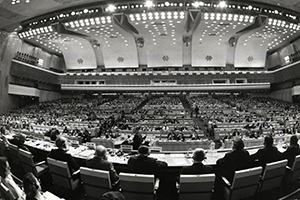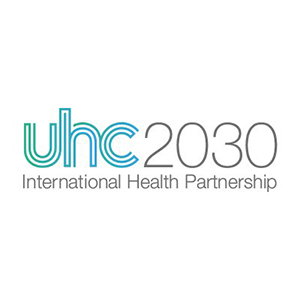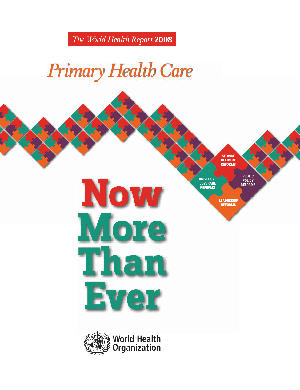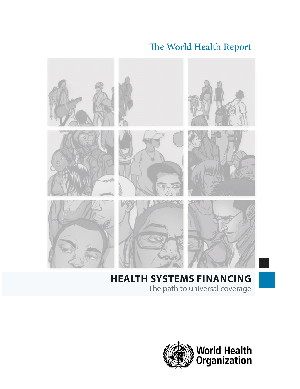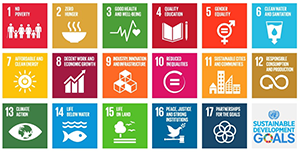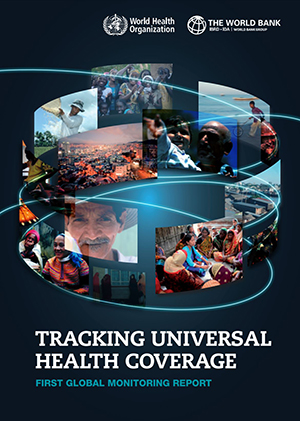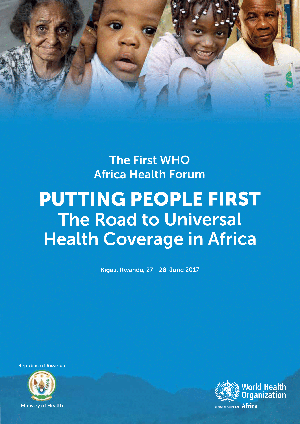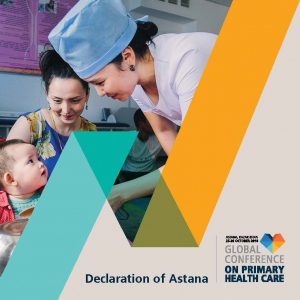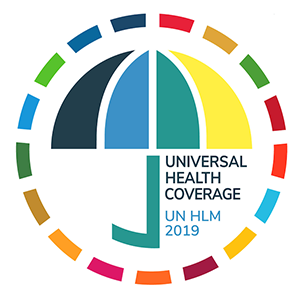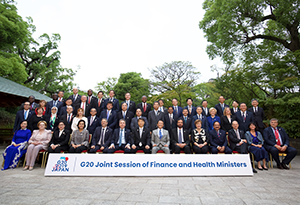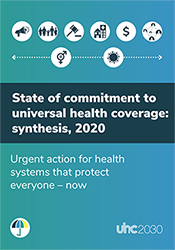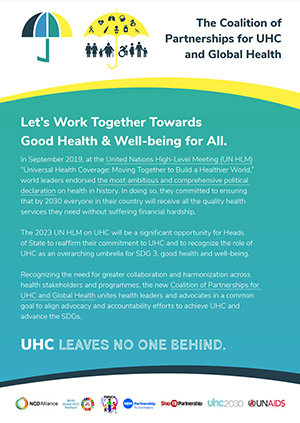-
1946 WHO Constitution recognizes the right to health
The enjoyment of the highest attainable standard of health is one of the fundamental rights of every human being without distinction of race, religion, political belief, economic or social condition.”
Read more -
1978 Alma Ata Declaration reaffirms the need to achieve health for all
Meeting in Almaty, Kazakhstan in 1978, 134 WHO member states at the International Conference on Primary Health Care (PHC) emphasized the role of governments in protecting the right to health and the importance of PHC as a cornerstone of health system reforms to achieve health equity.
Governments have a responsibility for the health of their people which can be fulfilled only by the provision of adequate health and social measures.”
Read more -
2001 Abuja Declaration
African Union members met in Abuja, Nigeria in 2001 and pledged to allocate more resources to health challenges, highlighting in particular HIV, malaria and tuberculosis. Advocates have rallied around the Abuja Declaration and held their governments to meet the commitment to increase domestic health spending.
We pledge to set a target of allocating at least 15% of our annual budget to the health sector.”
Read more -
2007 Launch of International Health Partnership
The International Health Partnership (IHP+) began in 2007 as an international partnership that aimed to improve effective development cooperation in health to help meet the Millennium Development Goals. The IHP+ approach included providing support to strong and comprehensive country and government-led national health plans in a well-coordinated way. The IHP+ became UHC2030 by 2016.
Read more -
2008 The World Health Report 2008
Primary Health Care: Now More Than Ever
Published 30 years after the Alma Ata declaration, this report reasserted the role of primary health care (PHC) in health systems and focused on achieving equity. It suggested reforms in four core PHC principles: (a) universal health coverage (b) people-centered services (c) healthy public policies (d) leadership.
“The fundamental step a country can take to promote health equity is to move towards universal coverage: universal access to the full range of personal and non-personal health services they need, with social health protection.”
Read report -
2010 World Health Report on Health System Financing: The Path to UHC
The WHO’s World Health Report in 2010 focused on what governments can do to reform health care financing to achieve UHC based on case studies and new research. The report maps out action items in three areas: (a) raising more funds for health or diversifying funding sources, (b) providing or maintaining an adequate level of financial risk protection, (c) improving efficiency and equity in the way funds are used.
Universal coverage requires a commitment to cover 100% of the population. Every country can do something to move closer to universal coverage or maintain what it has achieved.”
Read more -
2012 First UN Resolution endorsing UHC
The United Nations General Assembly endorsed a resolution urging countries to accelerate progress toward UHC as an essential priority for international development on 12 December 2020.
It is essential to take into consideration the needs of vulnerable segments of society, including the poorest and marginalized segments of the population, indigenous peoples and persons with disabilities.”
When managing the transition of the health system to universal coverage, each option will need to be developed within the particular epidemiological, economic, sociocultural, political and structural context of each country in accordance with the principle of national ownership.”
Read more -
2015 Launch of Sustainable Development Goals
World leaders at a historic UN Summit in September adopted 17 Sustainable Development Goals (SDGs) as part of of the 2030 Agenda for Sustainable Development. These include:
SDG 3: Good Health and Well-being: Ensure healthy lives and promote well-being for all at all ages
- Target 3.8: Achieve universal health coverage, including financial risk protection, access to quality essential health-care services and access to safe, effective, quality and affordable essential medicines and vaccines for all.
To promote physical and mental health and well-being, and to extend life expectancy for all, we must achieve universal health coverage and access to quality health care. No one must be left behind.”
– 2030 Agenda for Sustainable Development, paragraph 26
See the goals -
2015 Tracking Universal Health Coverage: First Global Monitoring Report
WHO and the World Bank released the first global monitoring report to assess countries’ progress toward UHC. The report noted that in 2013, at least 400 million people lacked access to at least one essential health service. It examines global access to health services, such as access to clean water and sanitation, family planning, skilled birth attendance, antenatal care, child immunization, antiretroviral therapy and tuberculosis treatment.
Read more -
2016 G7 Ise-Shima Vision for Global Health
Leaders at the 42nd G7 summit hosted by Japan committed to taking concrete actions to advance global health and strengthen the global health architecture. The statement “Vision for Global Health” recognized the importance of achieving UHC and the necessary connection to health systems strengthening (HSS), and supported the establishment of UHC2030 (see above, IHP+ launch in 2007).
Read more -
2017 G20 Leaders’ Declaration: Shaping an Interconnected World (Hamburg)
We recall universal health coverage is a goal adopted in the 2030 Agenda and recognize that strong health systems are important to effectively address health crises. We call on the UN to keep global health high on the political agenda and we strive for cooperative action to strengthen health systems worldwide, including through developing the health workforce.”
Read more -
2017 First WHO Africa Health Forum
Hosted by Rwanda with the theme of “Putting People First: The Road to Universal Health Coverage in Africa”, the forum explored the priorities and challenges of health care systems in Africa and recommendations to achieve health for all.
Read report -
2017 First UHC Day
The United Nations proclaimed 12 December as International Universal Health Coverage Day (UHC Day) by resolution 72/138. On 12-15 December, the UHC Forum in Tokyo brought together governments, multilateral and bilateral institutions, academia, private sector and civil society to mobilize around the global call for UHC.
Read the blog summary and the CSEM statement.
-
2018 Astana Declaration on Primary Health Care
40 years after the historic Alma-Ata Declaration, world leaders pledged to strengthen their PHC systems at Astana, Kazakhstan. The declaration includes commitments in four key areas: (1) make bold political choices for health across all sectors; (2) build sustainable primary health care; (3) empower individuals and communities; and (4) align stakeholder support to national policies, strategies and plans.
We find it ethically, politically, socially and economically unacceptable that inequity in health and disparities in health outcomes persist…We envision primary health care and health services that are high quality, safe, comprehensive, integrated, accessible, available and affordable for everyone and everywhere, provided with compassion, respect and dignity by health professionals who are well-trained, skilled, motivated and committed.”
Read more -
2018 Group of Friends of UHC and Global Health launched
The Group of Friends of UHC was established in December 2018 as an informal platform for UN Member States to build momentum towards achieving UHC by 2030. This Group contributed to the Political Declaration of the High-level Meeting on Universal Health Coverage in September 2019. The Group has 64 member countries and areas, and is currently co-facilitated by Japan, Thailand and Georgia.
Read more -
2019 UN High-Level Meeting on UHC
Political Declaration commits to achieve UHC by 2030
We commit to […] Ensure that no one is left behind, with an endeavour to reach the furthest behind first, founded on the dignity of the human person and reflecting the principles of equality and non-discrimination, as well as to empower those who are vulnerable or in vulnerable situations and address their physical and mental health needs which are reflected in the 2030 Agenda for Sustainable Development, including all children, youth, persons with disabilities, people living with HIV/AIDS, older persons, indigenous peoples, refugees and internally displaced persons and migrants.”
Read more -
2019 First G20 Joint Session of Finance and Health Ministers
Held in Osaka, Japan in June 2019, the first-ever joint session brought together health and finance ministers of G20 member countries and invited guest countries to focus on health financing for achieving UHC. Outcomes included the G20 Shared Understanding on the Importance of UHC Financing in Developing Countries.
Read more -
2020 Special Session of the UNGA on COVID-19
The United Nations General Assembly held a special session to discuss the impacts of the COVID-19 pandemic on people, societies and economies and outline a multifaceted, coordinated response required to address this crisis.
Looking ahead, the recovery from COVID-19 must address the pre-existing conditions it has exposed and exploited, from gaps in basic services to an overheated planet. Stronger health systems and Universal Health Coverage must be a priority”
– Statement by UN Secretary-General António Guterres
Read more -
2020 UN Secretary‑General’s policy brief on UHC and COVID-19
The policy brief, ‘COVID-19 and Universal Health Coverage’ emphasizes the critical link between global goals to achieve UHC and the response to the COVID-19 pandemic. At the launch of the brief, UN Secretary‑General António Guterres noted:
All countries have agreed to work towards universal health coverage as part of the 2030 Agenda for Sustainable Development. But, we cannot wait 10 years. We need universal health coverage, including mental health coverage, now, to strengthen efforts against the pandemic and prepare for future crises.”
Read more -
2020 First State of UHC Commitment Review
Around UHC Day 2020, UHC2030 released the first synthesis of the State of UHC Commitment. It is structured around the eight areas of commitment covered in the 2019 Political Declaration on UHC and presents a multi-stakeholder review on progress toward UHC around the world.
Read more -
2020 Launch of the Global Action Plan (GAP)
The Global Action Plan for Healthy Lives and Well-being for All brings together 13 multilateral health, development and humanitarian agencies to better support countries to accelerate progress towards the health-related SDGs. Although each agency has a specific mandate, the agencies as a group complement each other. Together, the agencies work to advance all the SDG3 targets and collectively, they channel around one-third of development assistance for health annually.
The 13 agencies are:
- World Health Organization
- World Food Programme
- United Nations Development Fund
- United Nations Population Fund
- United Nations Children’s Fund
- Gavi, the Vaccine Alliance
- Global Financing Facility for Women, Children & Adolescents
- International Labour Organization
- The Global Fund to Fight AIDS, Tuberculosis & Malaria
- Joint United Nations Programme on HIV/AIDS
- Unitaid
- United Nations Entity for Gender Equality & the Empowerment of Women
- World Bank Group
Read more -
2021 G7 Health Declaration
G7 leaders meeting in the UK in 2021 recommitted to the focus on UHC during the COVID-19 crisis, noting that progress in global health security requires prioritizing UHC and health systems strengthening.
Read more -
2021 Launch of the Coalition of Partnerships for UHC and Global Health
The Coalition of Partnerships for UHC and Global Health unites health leaders and advocates in a common goal to align advocacy and accountability efforts to achieve UHC and advance the SDGs. The Coalition will work together to assist Member States and other stakeholders in: (a) Accelerating high-level political efforts around socio-political accountability to ensure UHC delivers for vulnerable populations (b) Supporting coordination among the various existing health initiatives and joint follow-up actions of UN HLMs for the preparation of the future UN HLMs on the health agenda (c) Strengthening existing SDG accountability mechanisms to scale up efforts on health-related SDGs by 2023 and beyond.
Read more -
2023 UN High-Level Meeting on UHC
Looking ahead to 2023, the UN High-Level Meeting on UHC will be a critical time to direct attention to UHC and reignite commitments from countries around the world.
Join us for UHC Day, the next global milestone on the road to UHC!
Find out more
TEST TIMELINE
Start
On to 2023!

